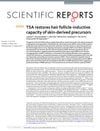 72 citations,
June 2001 in “Journal of Investigative Dermatology”
72 citations,
June 2001 in “Journal of Investigative Dermatology” S100A4 and S100A6 proteins may activate stem cells for hair follicle regeneration and could be potential targets for hair loss treatments.
 24 citations,
January 1989 in “Archives of biochemistry and biophysics”
24 citations,
January 1989 in “Archives of biochemistry and biophysics” Male rats have androgen receptors in their liver, which are different from proteins that bind estrogen.
3 citations,
August 2021 in “Nutrition research” Estrogen affects how vitamin A is processed in mouse skin, which may impact acne treatment, hair growth, and skin defense.
84 citations,
December 2008 in “Developmental biology” Retinoic acid-binding proteins in skin are regulated by β-catenin and Notch signalling.
 37 citations,
April 2011 in “Journal of Biological Chemistry”
37 citations,
April 2011 in “Journal of Biological Chemistry” LEF1 interacts with Vitamin D Receptor, affecting hair follicle regeneration and this could be linked to hair loss conditions.
 11 citations,
April 2020 in “Life sciences”
11 citations,
April 2020 in “Life sciences” Pantothenic acid helps mink hair follicles grow by affecting certain cell signals.
 18 citations,
June 2017 in “Proceedings of the National Academy of Sciences of the United States of America”
18 citations,
June 2017 in “Proceedings of the National Academy of Sciences of the United States of America” A gene called Gk5 controls lipid production in the skin and affects hair growth.
 28 citations,
November 2018 in “Journal of Cellular and Molecular Medicine”
28 citations,
November 2018 in “Journal of Cellular and Molecular Medicine” CXXC5 is a protein that controls cell growth and healing processes, and changes in its activity can lead to diseases like cancer and hair loss.

CaBP1 and 2 are important for maintaining the activity of calcium channels necessary for hearing in inner ear cells.
 6 citations,
May 2014 in “Biomarkers and Genomic Medicine”
6 citations,
May 2014 in “Biomarkers and Genomic Medicine” Charnoly bodies could be a marker for cell damage, and certain nutrients and proteins might prevent them, potentially helping with brain diseases and cancer.
22 citations,
August 1999 in “Mechanisms of Development” Pmg-1 and Pmg-2 are new genes important for skin and mammary gland development.
25 citations,
July 2016 in “Molecular biology of the cell” A protein in plants needs to bind two lipids to help with root hair growth, and this process is similar across different plant species.
April 2024 in “Biomolecules” Exosomal miRNAs from stem cells can help improve skin health and delay aging.
 September 2024 in “Journal of Cosmetic Dermatology”
September 2024 in “Journal of Cosmetic Dermatology” Ectoin helps prevent cortisone-induced skin problems and supports skin health.
 3 citations,
September 2023 in “Skin research and technology”
3 citations,
September 2023 in “Skin research and technology” New treatments for skin damage from UV light using stem cells and their secretions show promise for skin repair without major risks.
56 citations,
March 2003 in “Journal of Investigative Dermatology” 17β-estradiol can reduce inflammation in the skin.
 64 citations,
November 2012 in “EMBO reports”
64 citations,
November 2012 in “EMBO reports” Lamins are vital for cell survival, organ development, and preventing premature aging.
 18 citations,
February 2019 in “Scientific Reports”
18 citations,
February 2019 in “Scientific Reports” Trichostatin A helps restore hair-growing ability in skin cells used for hair regeneration.
 January 1995 in “Adolescent and pediatric gynecology”
January 1995 in “Adolescent and pediatric gynecology” Mutations in the androgen receptor gene cause different levels of androgen insensitivity, making it hard to create simple tests for the condition.
665 citations,
April 2016 in “Nature communications” Blocking specific proteins can help remove aging cells and might treat age-related diseases and promote hair growth.
165 citations,
December 2004 in “Differentiation” BMP signaling is crucial for skin and hair growth.
 20 citations,
September 2005 in “Endocrinology”
20 citations,
September 2005 in “Endocrinology” Certain changes to the B-ring of androgen receptor ligands can increase their effectiveness for potential treatments of muscle and bone conditions.
 6 citations,
November 2017 in “Scientific reports”
6 citations,
November 2017 in “Scientific reports” The R343H mutation in the VDR gene causes vitamin D-resistant rickets with alopecia by impairing specific gene activity.
 62 citations,
January 2004 in “The journal of investigative dermatology/Journal of investigative dermatology”
62 citations,
January 2004 in “The journal of investigative dermatology/Journal of investigative dermatology” A second domain of high sulfur KAP genes on chromosome 21q23 is crucial for hair structure.
 27 citations,
August 2005 in “The journal of investigative dermatology/Journal of investigative dermatology”
27 citations,
August 2005 in “The journal of investigative dermatology/Journal of investigative dermatology” Researchers found new genes involved in hair growth, which could help develop new hair treatments.
 5 citations,
December 2021 in “Frontiers in Cell and Developmental Biology”
5 citations,
December 2021 in “Frontiers in Cell and Developmental Biology” Enzymes called PADIs play a key role in hair growth and loss.
 132 citations,
January 2017 in “International Journal of Molecular Sciences”
132 citations,
January 2017 in “International Journal of Molecular Sciences” Fat-derived stem cells show promise for skin repair and reducing aging signs but need more research for consistent results.
 6 citations,
January 2020 in “The journal of investigative dermatology/Journal of investigative dermatology”
6 citations,
January 2020 in “The journal of investigative dermatology/Journal of investigative dermatology” New topical treatment using spherical nucleic acids shows promise in reducing psoriasis inflammation.
 12 citations,
June 2021 in “Scientific Reports”
12 citations,
June 2021 in “Scientific Reports” Curcumin may help reverse aging by targeting specific genes.
2 citations,
September 2023 in “International journal of molecular sciences” Special proteins are important for skin balance, healing, and aging, and affect skin stem cells.




















